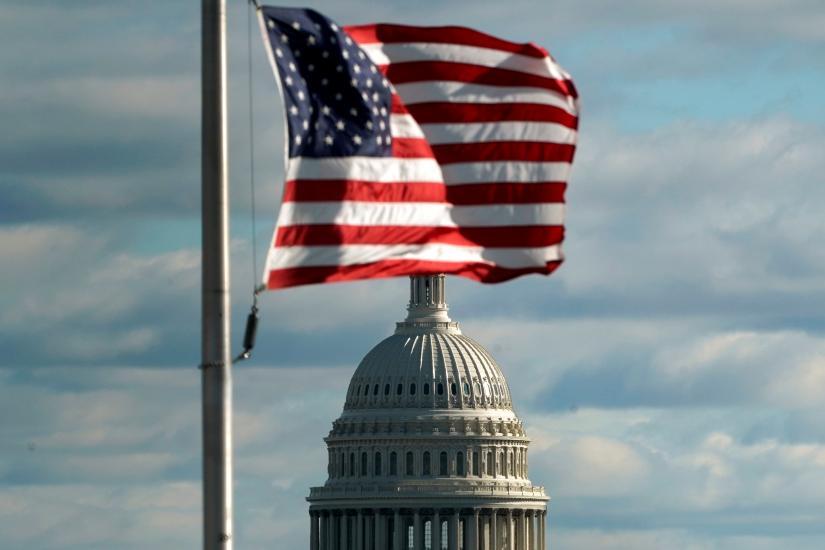 US Secretary of Defense James Mattis's sudden decision to quit is a reminder that these are not ordinary times in Washington. His departure came as President Donald Trump ordered a withdrawal of US forces from Syria, amidst suggestions that he'll pull thousands out of Afghanistan too. He resigned after developing disagreements on foreign policy with the president.
US Secretary of Defense James Mattis's sudden decision to quit is a reminder that these are not ordinary times in Washington. His departure came as President Donald Trump ordered a withdrawal of US forces from Syria, amidst suggestions that he'll pull thousands out of Afghanistan too. He resigned after developing disagreements on foreign policy with the president.
President Trump is mercurial. He is not a member of the Washington foreign policy establishment. He conducts himself as a businessman where it’s acceptable to throw out people in position and see what the reaction is even if you don’t intend to take any decisions.
He insists in tweeting. He’s incredibly undisciplined in his public messaging. It’s fair to say he drives the bureaucracy crazy. But, there’re other responsible people around him. They may not have the profile stature and the base of support and respect around Washington that Mattis has. But, there are still good people working in the government in positions of authority.
It’s so difficult to put a label on the Trump administration. It is complex and in many ways also somewhat difficult to put in a box. As Trump’s White House has said: their big motto is ‘America First’ that has been translated in many ways e.g.- withdrawal from multilateral agreements. It means basically putting a question mark behind US’ integrity in NATO. He was saying in principle – we want to withdraw from most of the multilateral commitments that we have around the world if they don’t serve our interests directly.
However, he made some u-turns wherever he saw fit to do so and Mattis was a very important character in monitoring some of these u-turns that the Trump administration made which were very important. Particularly the moves on NATO was a product of his counsel.
With Mattis gone, The White House has a lot of hawkish people in very prestigious, high-profile positions. And, many of these hawks might push him to take more rigid, more outlandish positions from US policy establishment point of view----especially in relation to the Middle East, over which Mattis had to part company with the president.
The Trump administration is one that doesn’t believe in multilateralism only if it doesn't really serve their national interest.
Whoever comes in next, the Secretary of Defense may well be more hawkish on issues like Iran, sanctions on against it, etc. and that may push the President into taking a more extreme position. What’s the President looking for in his next Secretary of Defense? Issues relating to sanctions are determined primarily by Treasury and State and he’s pretty much comfortable with the guys he has there and of course, there's John Bolton.
The next Secretary of Defense is going to focus more on the internal nuts and bolts of running the Department of Defense and rebuilding IT from the perspective of Trump’s supporters. IT has been run down in 17 years of fighting insurgencies in the Middle East. That does not directly affect American interests at this moment. And, instead to rebuild the capacity to confront competitors like Russia if they try to assault the Baltics or China tries to take Taiwan.
He’s going to look at that sort of thing and when one looks at his appointments, the elevation of General Mark Milley from the Army Chief of Staff to the Chairman of Joint Chief of Staff, for instance, signals the rebuilding of the army for massive conventional warfare. We’ll see something like that. We’ll see more of a technocrat rather than ideologue at work.
When Trump has decided to withdraw 7,000 from the 14,000 troops, commentators saw it as premature and it conveys a US negative image because the Afghan government has yet to strike a deal with the Taliban. This will add to the morale of the Taliban as they believe they have time on their side. Is it time for the Afghans to look for another, more reliable ally than the US government. Is it time to start to look to India for example, Pakistan, China. It’s a very difficult undertaking. Afghanistan does not enjoy a very healthy relationship with Pakistan and India is quite far off. India can’t come and replace the United States. It would be difficult for China to come into the matrix and replace the US as well.
Is it time for the Afghans to look for another, more reliable ally than the US government. Is it time to start to look to India for example, Pakistan, China. It’s a very difficult undertaking. Afghanistan does not enjoy a very healthy relationship with Pakistan and India is quite far off. India can’t come and replace the United States. It would be difficult for China to come into the matrix and replace the US as well.
One is sure that nobody could replace the United States in terms of financial aid, military aid and international credibility that is enjoyed by the Afghan government.
It’s very important for the Afghans and their government to focus on fixing the problems within their country. The question is: Is Taliban willing to talk to the Afghan government? Because the Taliban stand is very hawkish as to whether they would want to talk to the Americans and not the Afghan government believes that the Afghan government is a puppet regime. It’s the Americans who toppled their regime so they will talk to the Americans alone.
Taliban being a non-state actor have been fighting quite hard over the past 17 years and making major gains over the past 4-5 years. It’s not a good sign for the Afghan government and the people at large. It’s very important to focus on how the Afghan government can achieve a peace deal inside Afghanistan.
On Syria, from an operational point of view, the American departure won’t make a huge difference considering that they have already in many ways invested in surrogate warfare (a war by delegation where the Americans have a relatively small contingent with boots on the ground using massive force multipliers with local forces). So, these operations are interesting to a degree because they allow the Americans to stay on the ground to create a context which will not lead to victory necessarily but keep a balance whether the Americans still have a say. Strategically, however, both decisions on Syria and Afghanistan are highly problematic because they send a signal to allies and opponents across the region that Americans are no longer interested to bear the burden of war in that region as they might have done earlier.
And, by withdrawing from Syria now the US is sending a signal to its allies. For instance, in Afghanistan's case, Washington is sending the signal to the Afghan National Forces that it’s no longer necessarily supporting Afghan National Forces at the level it had promised. And, then exposing them to the risk of insurgency at this time in Afghanistan! ------ it might be ISIS and the Taliban. In Syria, it might be ISIS and others.
The US is exposing them to a huge risk without sufficient air support, sufficient boots, trainers and directors on the ground. So, surrogate warfare is problematic as it is but at least it allows the Americans to withdraw from Syria. The US is sending a signal to Iran, Turkey and Russia who’re the real big players, that the US is not only interested in being just another player in post-conflict Syria.
And, stabilization in both conflicts in Syria and Afghanistan means the US needs long-term commitments in order to oversee the stabilization process. By withdrawing, the West completely loses any way in of determining how the process of stabilization in the future will GO. In many ways its move allows the insurgent to regain their ground.
Md. Sharif Hasan teaches international relations at the University of Rajshahi.
 Opinion
Opinion
30762 hour(s) 27 minute(s) ago ;
Afternoon 01:21 ; Saturday ; Apr 20, 2024
Can US be a dependable ally?
Send
Md. Sharif Hasan
Published : 17:15, Jan 08, 2019 | Updated : 17:34, Feb 06, 2019
Published : 17:15, Jan 08, 2019 | Updated : 17:34, Feb 06, 2019
0 ...0 ...
/ab/pdn/
Topics: Md. Sharif Hasan
***The opinions, beliefs and viewpoints expressed in this article are those of the author and do not reflect the opinions and views of Bangla Tribune.
- KOICA donates medical supplies to BSMMU
- 5 more flights to take back British nationals to London
- Covid19: Rajarbagh, Mohammadpur worst affected
- Momen joins UN solidarity song over COVID-19 combat
- Covid-19: OIC to hold special meeting
- WFP begins food distribution in Cox’s Bazar
- WFP begins food distribution in Cox’s Bazar
- 290 return home to Australia
- Third charter flight for US citizens to return home
- Dhaka proposes to postpone D8 Summit
Unauthorized use of news, image, information, etc published by Bangla Tribune is punishable by copyright law. Appropriate legal steps will be taken by the management against any person or body that infringes those laws.
Bangla Tribune is one of the most revered online newspapers in Bangladesh, due to its reputation of neutral coverage and incisive analysis.
F R Tower, 8/C Panthapath, Shukrabad, Dhaka-1207 | Phone: 58151324; 58151326, Fax: 58151329 | Mob: 01730794527, 01730794528


